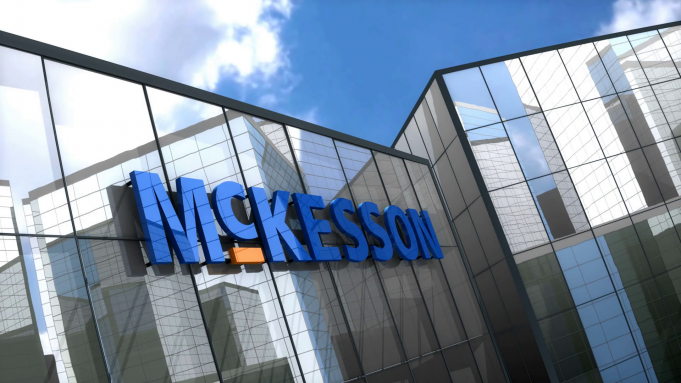McKesson Corporation provides pharmaceuticals and medical supplies in the United States and internationally. The company operates in two segments, McKesson Distribution Solutions and McKesson Technology Solutions. The McKesson Distribution Solutions segment distributes branded and generic pharmaceutical medications, and other healthcare-related products; and provides practice management, technology, clinical support, and business solutions to community-based oncology and other specialty practices. This segment also provides specialty pharmaceutical solutions for pharmaceutical manufacturers; and medical-surgical supply distribution, logistics, and other services to healthcare providers. In addition, this segment operates retail pharmacy chains in Europe and Canada, as well as supports independent pharmacy networks in North America and Europe; and supplies integrated pharmacy management systems, automated dispensing systems, and related services to retail, outpatient, central fill, specialty, and mail order pharmacies. This segment serves retail national accounts, including national and regional chains, food/medication combinations, mail order pharmacies, and mass merchandisers; and institutional healthcare providers, such as hospitals, health systems, integrated delivery networks, and long-term care providers, as well as offers its services to pharmaceutical manufacturers. The McKesson Technology Solutions segment provides clinical, financial, and supply chain management solutions to healthcare organizations. McKesson Corporation was founded in 1833 and is headquartered in San Francisco, California.

BUSINESS ANALYSIS OF MCKESSON
The Healthcare Services Sector is witnessing a major shakeup, new age business models in the industry are transforming both customers and businesses. Faced with this uncertainity, companies are investing resources to transform their business. An in-depth business analysis is a valuable resource to identify and articulate the need for a business model change. At R&P Research we believe, the starting point for a business analysis is Benchmarking. Business benchmarking can be done at various levels: 1) Industry Benchmarking 2) Peer Benchmarking 3) Disruptors Benchmarking. In this report, we share the snapshot of how McKesson compares against the industry on the major performance indicators. This analysis, along with peer group/disruptors benchmarking and revenue model understanding can help identify growth and cost optimization opportunities to maximize the value delivered by McKesson to its stakeholders. R&P Research Industry Intelligence Platform provides historical data for last 15 years with an easy to use benchmarking interface for an in-depth comparative business analysis.
- Revenue Growth: McKesson reported a revenue growth of 6.6% year-on-year during 2016. Medication Stores, PBM and Distributors Industry grew at 10.3% in the same period
- COGS share of Revenues: As a percentage of revenue, McKesson spent 94.0% of its total revenues on COGS. Medication Stores, PBM and Distributors industry average (COGS share of revenue) in the same period was 88.6%
- R&D; share of Revenues: As a percentage of revenue, McKesson spent 0.2% of its total revenues on R&D.; Medication Stores, PBM and Distributors industry average R&D; spending in the same period was 0.0%
- SG&A; share of Revenues: As a percentage of revenue, McKesson spent 3.8% of its total revenues on Sales, Marketing, and General Administration (SG&A;). Medication Stores, PBM and Distributors industry average SG&A; spending in the same period was 7.8%
- Inventory share of Revenues: As a percentage of revenue, McKesson spent 8.0% of its total revenues on Inventories. Medication Stores, PBM and Distributors industry average Inventory spending in the same period was 7.5%
- Accounts Payable share of Revenues: As a percentage of revenue, McKesson invested 15.0% of its total revenues on Accounts Payable (A/P) Medication Stores, PBM and Distributors industry average Accounts Payable investment in the same period was 12.5%
- Accounts Receivable share of Revenues: As a percentage of revenue, McKesson invested 9.4% of its total revenues on Accounts Receivable (A/R). Medication Stores, PBM and Distributors industry average Accounts Receivable investment in the same period was 7.1%
- PP&E; share of Revenues: As a percentage of revenue, McKesson invested 1.2% of its total revenues on Property, Plants, and Equipments (PP&E;). Medication Stores, PBM and Distributors industry average PPE investment in the same period was 3.8%
- Intangibles share of Revenues: As a percentage of revenue, McKesson invested 6.7% of its total revenues on Intangibles. Medication Stores, PBM and Distributors industry average Intangibles investment in the same period was 17.2%
- Net Margins: McKesson Net Margins in the year 2016 were 1.2%. Medication Stores, PBM and Distributors industry average Net Margins in the same period were 2.1%

SECTOR AND INDUSTRY ASSOCIATION OF MCKESSON
For the purpose of performance benchmarking of a company with a sector or industry average, R&P; Research associates every company with one sector and one industry. An industry consists of companies with related/similar business models. A sector comprises of a group of related/similar industries. For high-level analysis purposes, related/similar sectors are grouped into sector groups.
McKesson is associated with Healthcare Sector Group, Healthcare Services Sector, and Medication Stores, PBM and Distributors Industry.
Healthcare Services sector is comprised of the following industries: Medication Stores, PBM and Distributors; Healthcare Payers; Healthcare Providers; Medical Software; Healthcare Research Services. The definitions for each of the industries is as follows:
- Medication Stores, PBM and Distributors industry includes nationwide medication store chains, pharmacy benefit management (PBM) companies, and medication distributors. Medication stores also offer walk-in clinics and related pharmacy services. Distributors distribute branded and generic pharmaceutical and other healthcare products to hospitals, pharmacies and other healthcare providers. PBMs are primarily responsible for developing and maintaining the formulary, contracting with pharmacies, negotiating discounts and rebates with pharmacy manufacturers, and processing and paying prescription pharmacy claims.
- Healthcare Payers industry includes healthcare insurance companies that finance or reimburse the cost of health services. These companies also offer collaborative care, population health management, healthcare technology, Pharmacy Benefit Management, analytics, consulting and administrative services.
- Healthcare Providers industry consist primarily of hospitals but recent changes in the health services industry have contributed to both increasing numbers of other types of facility providers. Companies in this industry include traditional healthcare providers and emerging healthcare facility providers like ambulatory surgery centers, behavioral healthcare facilities, dialysis clinics, home health care companies and others.
- Medical Software industry includes companies that offer any software item or system used within a healthcare context. These companies offer standalone software used for diagnostic, therapeutic purposes, clinical financial and operational purposes.
- Healthcare Research Services industry includes companies that offer biopharmaceutical development services, commercial outsourcing services; commercial pharmaceutical sales and service organizations, consulting, health information analytics and technology consulting.

INDUSTRY RANKING OF MCKESSON
With $190.9 billion revenues, McKesson ranked number 1 of all the companies in the US Medication Stores, PBM and Distributors industry. There were a total of 14 public companies in the US Medication Stores, PBM and Distributors industry that had revenues greater than $50 million during 2016.
The top-10 companies in the US Medication Stores, PBM and Distributors industry by revenues during 2016 were:
- McKesson ($190.9 billion)
- CVS Health ($177.5 billion)
- AmerisourceBergen ($146.8 billion)
- Cardinal Health ($121.5 billion)
- Walgreens Boots Alliance ($117.4 billion)
- Express Scripts Holding ($100.3 billion)
- Rite Aid ($30.7 billion)
- Henry Schein ($11.6 billion)
- Owens & Minor ($9.7 billion)
- Patterson Companies ($5.4 billion)

BUSINESS MODEL ANALYSIS (BMA) FRAMEWORK
We use the following framework to assess the business model of a company. Business Model Analysis framework can be used by organizations to articulate growth strategies and identify cost optimization opportunities. Technology and consulting companies can use this framework to identify the value drivers and pain points of their targeted customers. Entrepreneurs can use this framework to understand the language of business and identify promising business opportunities. This framework can be used by any professional aspiring to take up a leadership role to better understand the businesses challenges, articulate growth strategy, and monitor the business improvement requirements for the organization.















